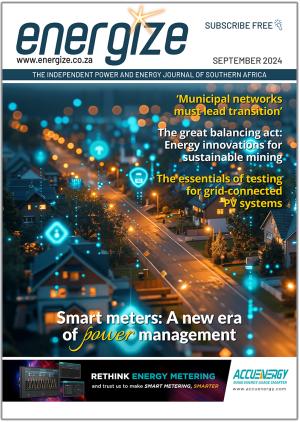Political leaders say South Africa’s energy sector has much to learn from its BRICS counterparts as it seeks strategies to improve power infrastructure and expand renewable energy capacity.
Speaking at the ninth annual meeting of the BRICS New Development Bank (NDB), Acting Minister of Electricity and Energy Patricia de Lille said: “We are eager to learn from the vast experiences and innovations within BRICS countries, drawing from your successes in diversifying energy sources, improving energy efficiency and expanding access to clean energy.”
She cited successful examples:
- Brazil, China and India have set benchmarks in solar and wind energy
- BRICS expertise in nuclear energy
- Brazil and India have independent transmission projects enhancing grid reliability and expanding access to remote areas.
“By using these examples, South Africa can introduce speed, scale and agility into the development of its own transmission infrastructure,” said De Lille.
Deputy President Paul Mashatile noted the following achievements:
- China’s scaling of renewable energy capacity and modernisation of grid infrastructure
- India’s progress in rural electrification and integrating large-scale renewables
- Brazil’s expertise in hydroelectric power and bioenergy
- Russia’s strategies for managing an extensive transmission network.
Mashatile praised the NDB for approving US$2,3 billion (R41,4 billion) in funding for 10 renewable energy projects in South Africa, which will install 2,8 GW of generation capacity. However, he acknowledged the “sluggish” disbursement of funds for these authorised projects being addressed by the Ministry of Finance.
Despite the contributions of the NDB to developing renewable capacity, transmission remains a critical issue that requires additional funding. Building 14 000 km of transmission lines needed to meet future energy demands is a challenge due to misalignment between the location of the best wind and solar resources and areas with the highest electricity demand. Additionally, Eskom’s financial difficulties limit its ability to attract capital, De Lille said.
“This is a mammoth task given various supply chain and industry constraints such as the extended lead times involved in the supply of complex transmission equipment amid increased global demand.”
The national shortage of technical skills is another challenge, noted De Lille.
Finance Minister Enoch Godongwana said the South African government views the NDB as a critical partner in funding infrastructure development. “We look to the NDB to provide solutions aimed at de-risking infrastructure projects, through its financial instruments, to attract private capital.”















